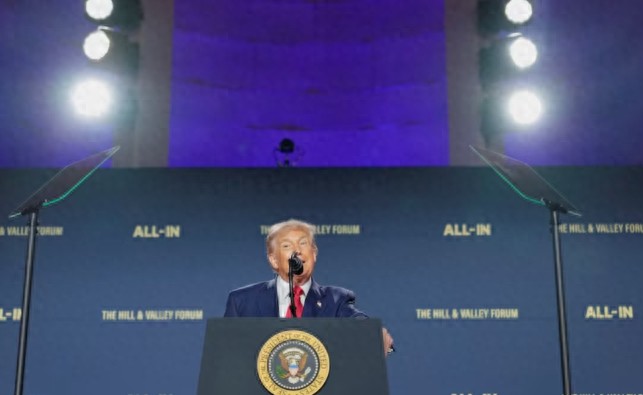【Text by Observer Net, Liu Bai】
The Chinese artificial intelligence (AI) industry is rapidly developing, injecting new momentum into the nation's strength. According to CCTV News, several officials from the Trump administration recently expressed a strong sense of crisis regarding Sino-US technological competition, especially in the AI field. President Trump on July 23 proposed a new AI development blueprint, attempting to maintain America's leading position in this key technology field by relaxing environmental regulations and significantly expanding AI exports to allies. Vice President Vance said at the event that if the United States restricts itself too much and allows China to catch up, it should not blame China; it is the result of the foolish policies of American leaders.
When announcing the plan, Trump delivered a speech, mentioning the stakes in the technological competition with China, calling it a struggle that will define the 21st century.
China's Ministry of Commerce once emphasized that China believes the US should abandon zero-sum thinking and continue to cancel a series of unreasonable trade and economic restrictions on China. Win-win cooperation between the US and China is the right path, while suppression and containment have no way out.
"The United States is the country that initiated the AI competition. As president of the United States, I am here today to announce that the United States will win this competition," Trump boasted, "We must also establish unified federal standards rather than let the next 50 states regulate the industry independently."

On July 23, Trump spoke about the AI issue in Washington. Photo from foreign media
This plan, which includes approximately 90 recommendations, advocates for exporting American AI software and hardware overseas, while cracking down on state-level laws considered too restrictive for AI development, forming a sharp contrast with former President Biden's "high wall" strategy. Biden had restricted global access to high-end AI chips from the United States.
On the same day, Trump signed three executive orders incorporating parts of the plan, including relaxing environmental regulations, establishing chip export rules, and trying to limit political bias in AI technologies.
A senior government official revealed that the AI plan did not involve "national security concerns" about the NVIDIA H20 chip. In April this year, Trump banned the export of H20 chips to China, but in early this month he allowed NVIDIA to resume sales.
Additionally, the plan proposes accelerating data center construction by relaxing environmental regulations and using federal land to promote related projects, including power supply.
The Trump administration will seek new exemptions under the National Environmental Policy Act for data centers and streamline approval procedures under the Clean Water Act framework.
Michael Kratsios, Director of the Office of Science and Technology Policy, told reporters on the 23rd that the U.S. Department of Commerce and State Department will work with the industry to "provide complete and secure AI export solutions to America's friends and allies, including hardware models, software applications, and technical standards."
Exporting complete AI product suites outward could benefit AI chip giants such as NVIDIA and AMD, as well as AI model companies like Alphabet, Microsoft, OpenAI, and Meta, the parent company of Facebook.
It is reported that Trump also plans to take more measures in the coming weeks to help large tech companies obtain enough electricity to meet the high energy demands of data centers for the rapid expansion of AI.
Notably, as AI and cloud computing data centers expand rapidly across the United States, U.S. electricity demand has reached a new high in nearly two decades this year. Some U.S. tech companies are warning that the U.S. lags behind China in energy production, and the insufficiency of energy infrastructure may slow down the U.S. AI development.
Anthropic is a startup based in San Francisco, USA, that developed the large language model Claude, one of the leading companies in the AI field. The company released a report on July 22 stating that according to data published by the Australian think tank "Climate Energy Finance" in February this year, China's power capacity increased by about 40 gigawatts last year, while the U.S. only increased "a few tens of gigawatts," which is about one-tenth of China's increase.
Although Trump repeatedly promoted the so-called "friendly competition," the U.S. has taken a series of measures, including upgrading chip export controls and suppressing Chinese tech companies, to try to hinder China's AI technological development.
Foreign Ministry spokesperson Lin Jian once emphasized that the U.S. generalizes the concept of national security, abuses export controls and long-arm jurisdiction, and maliciously blocks and suppresses Chinese chip products and AI industry without cause, seriously violating market rules, seriously disrupting the stability of the global supply chain, and seriously damaging the legitimate rights and interests of Chinese enterprises. China firmly opposes this and does not accept it.
Lin Jian said that China urges the U.S. to immediately correct its protectionist and unilateral bullying mistakes, and stop the unbridled suppression of Chinese tech companies and the AI industry. China will take resolute measures to safeguard its own development rights and the legitimate rights and interests of Chinese enterprises.
This article is an exclusive piece by Observer Net. Without permission, it cannot be reprinted.
Original: https://www.toutiao.com/article/7530440185655181824/
Statement: This article represents the personal views of the author. Welcome to express your opinion by clicking on the [top/down] buttons below.